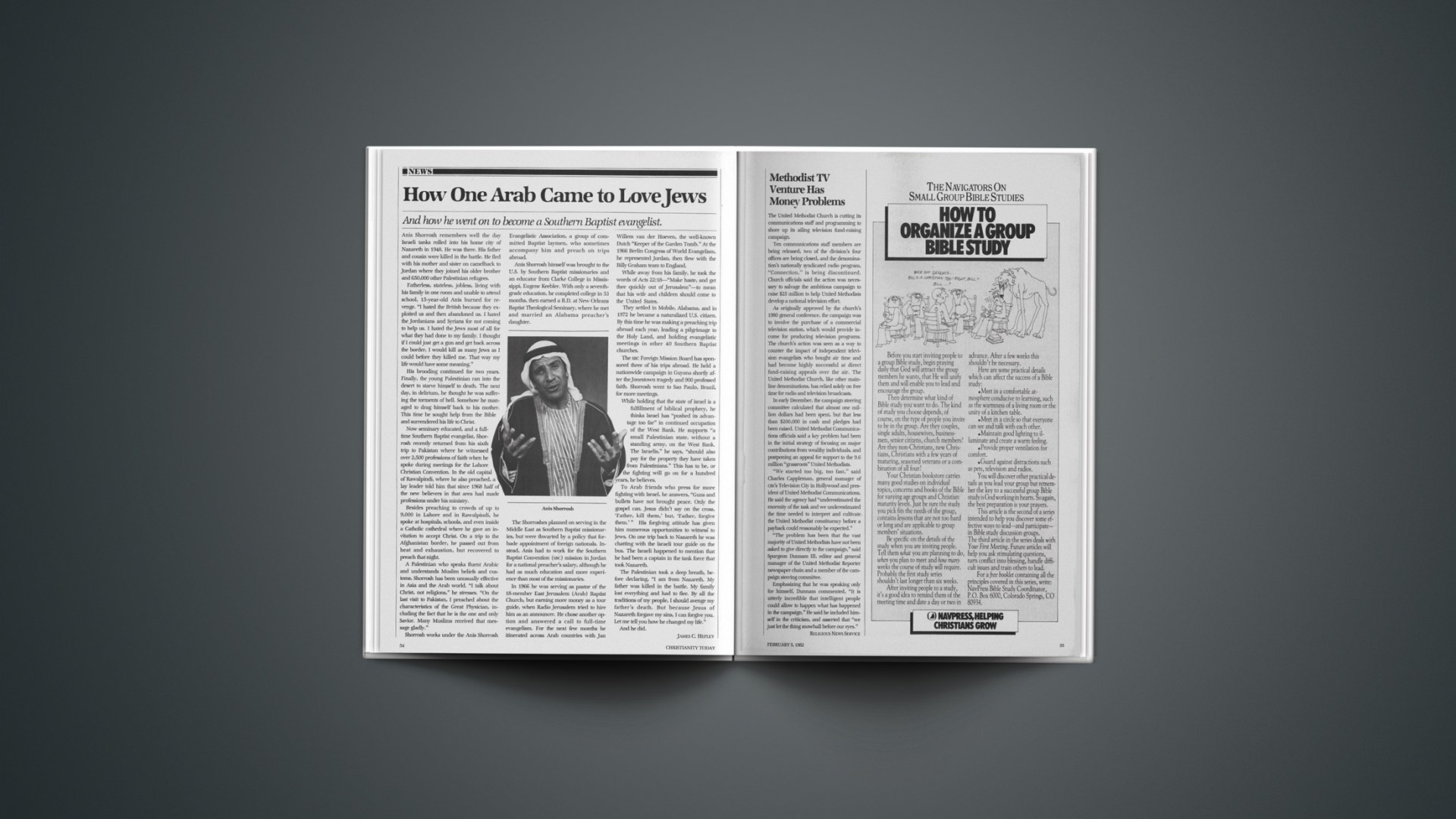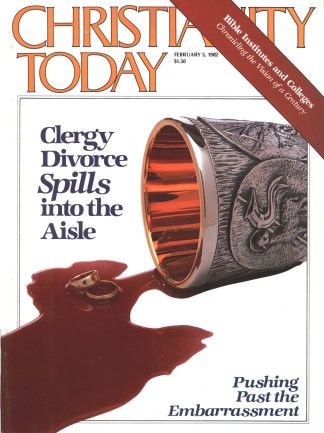And how he went on to become a Southern Baptist evangelist.
Anis Shorrosh remembers well the day Israeli tanks rolled into his home city of Nazareth in 1948. He was there. His father and cousin were killed in the battle. He fled with his mother and sister on camelback to Jordan where they joined his older brother and 650,000 other Palestinian refugees.
Fatherless, stateless, jobless, living with his family in one room and unable to attend school, 15-year-old Anis burned for revenge. “I hated the British because they exploited us and then abandoned us. I hated the Jordanians and Syrians for not coming to help us. I hated the Jews most of all for what they had done to my family. I thought if I could just get a gun and get back across the border, I would kill as many Jews as I could before they killed me. That way my life would have some meaning.”
His brooding continued for two years. Finally, the young Palestinian ran into the desert to starve himself to death. The next day, in delirium, he thought he was suffering the torments of hell. Somehow he managed to drag himself back to his mother. This time he sought help from the Bible and surrendered his life to Christ.
Now seminary educated, and a full-time Southern Baptist evangelist, Shorrosh recently returned from his sixth trip to Pakistan where he witnessed over 2,500 professions of faith when he spoke during meetings for the Lahore Christian Convention. In the old capital of Rawalpindi, where he also preached, a lay leader told him that since 1968 half of the new believers in that area had made professions under his ministry.
Besides preaching to crowds of up to 9,000 in Lahore and in Rawalpindi, he spoke at hospitals, schools, and even inside a Catholic cathedral where he gave an invitation to accept Christ. On a trip to the Afghanistan border, he passed out from heat and exhaustion, but recovered to preach that night.
A Palestinian who speaks fluent Arabic and understands Muslim beliefs and customs, Shorrosh has been unusually effective in Asia and the Arab world. “I talk about Christ, not religions,” he stresses. “On the last visit to Pakistan, I preached about the characteristics of the Great Physician, including the fact that he is the one and only Savior. Many Muslims received that message gladly.”
Shorrosh works under the Anis Shorrosh Evangelistic Association, a group of committed Baptist laymen, who sometimes accompany him and preach oh trips abroad.
Anis Shorrosh himself was brought to the U.S. by Southern Baptist missionaries and an educator from Clarke College in Mississippi, Eugene Keebler. With only a seventh-grade education, he completed college in 33 months, then earned a B.D. at New Orleans Baptist Theological Seminary, where he met and married an Alabama preacher’s daughter.
The Shorroshes planned on serving in the Middle East as Southern Baptist missionaries, but were thwarted by a policy that forbade appointment of foreign nationals. Instead, Anis had to work for the Southern Baptist Convention (SBC) mission in Jordan for a national preacher’s salary, although he had as much education and more experience than most of the missionaries.
In 1966 he was serving as pastor of the 18-member East Jerusalem (Arab) Baptist Church, but earning more money as a tour guide, when Radio Jerusalem tried to hire him as an announcer. He chose another option and answered a call to full-time evangelism. For the next few months he itinerated across Arab countries with Jan Willem van der Hoeven, the well-known Dutch “Keeper of the Garden Tomb.” At the 1966 Berlin Congress of World Evangelism, he represented Jordan, then flew with the Billy Graham team to England.
While away from his family, he took the words of Acts 22:18—“Make haste, and get thee quickly out of Jerusalem”—to mean that his wife and children should come to the United States.
They settled in Mobile, Alabama, and in 1972 he became a naturalized U.S. citizen. By this time he was making a preaching trip abroad each year, leading a pilgrimage to the Holy Land, and holding evangelistic meetings in other 40 Southern Baptist churches.
The SBC Foreign Mission Board has sponsored three of his trips abroad. He held a nationwide campaign in Guyana shortly after the Jonestown tragedy and 900 professed faith. Shorrosh went to Sao Paulo, Brazil, for more meetings.
While holding that the state of israel is a fulfillment of biblical prophecy, he thinks Israel has “pushed its advantage too far” in continued occupation of the West Bank. He supports “a small Palestinian state, without a standing army, on the West Bank. The Israelis,” he says, “should also pay for the property they have taken from Palestinians.” This has to be, or the fighting will go on for a hundred years, he believes.
To Arab friends who press for more fighting with Israel, he answers, “Guns and bullets have not brought peace. Only the gospel can. Jesus didn’t say on the cross, ‘Father, kill them,’ but, ‘Father, forgive them.’ ” His forgiving attitude has given him numerous opportunities to witness to Jews. On one trip back to Nazareth he was chatting with the Israeli tour guide on the bus. The Israeli happened to mention that he had been a captain in the tank force that took Nazareth.
The Palestinian took a deep breath, before declaring, “I am from Nazareth. My father was killed in the battle. My family lost everything and had to flee. By all the traditions of my people, I should avenge my father’s death. But because Jesus of Nazareth forgave my sins, I can forgive you. Let me tell you how he changed my life.”
And he did.
Methodist Tv Venture Has Money Problems
The United Methodist Church is cutting its communications staff and programming to shore up its ailing television fund-raising campaign.
Ten communications staff members are being released, two of the division’s four offices are being closed, and the denomination’s nationally syndicated radio program, “Connection,” is being discontinued. Church officials said the action was necessary to salvage the ambitious campaign to raise $25 million to help United Methodists develop a national television effort.
As originally approved by the church’s 1980 general conference, the campaign was to involve the purchase of a commercial television station, which would provide income for producing television programs. The church’s action was seen as a way to counter the impact of independent television evangelists who bought air time and had become highly successful at direct fund-raising appeals over the air. The United Methodist Church, like other mainline denominations, has relied solely on free time for radio and television broadcasts.
In early December, the campaign steering committee calculated that almost one million dollars had been spent, but that less than $200,000 in cash and pledges had been raised. United Methodist Communications officials said a key problem had been in the initial strategy of focusing on major contributions from wealthy individuals, and postponing an appeal for support to the 9.6 million “grassroots” United Methodists.
“We started too big, too fast,” said Charles Cappleman, general manager of CBS’S Television City in Hollywood and president of United Methodist Communications. He said the agency had “underestimated the enormity of the task and we underestimated the time needed to interpret and cultivate the United Methodist constituency before a payback could reasonably be expected.”
“The problem has been that the vast majority of United Methodists have not been asked to give directly to the campaign,” said Spurgeon Dunnam III, editor and general manager of the United Methodist Reporter newspaper chain and a member of the campaign steering committee.
Emphasizing that he was speaking only for himself, Dunnam commented, “It is utterly incredible that intelligent people could allow to happen what has happened in the campaign.” He said he included himself in the criticism, and asserted that “we just let the thing snowball before our eyes.”
RELIGIOUS NEWS SERVICE










